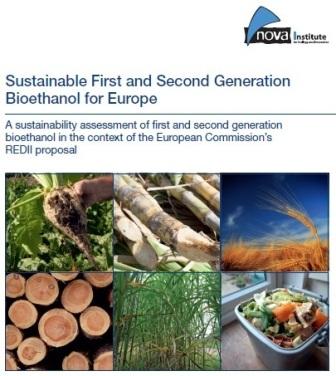Report: Sustainable first and second generation bioethanol
A sustainability assessment of first and second generation bioethanol in the context of the European Commission’s REDII proposal. Authors: Lara Dammer, Michael Carus, Dr. Stephan Piotrowski, Dr. Ángel Puente, Elke Breitmayer, Niels de Beus, Dr. Christin Liptow, Nova-Institute, September 2017
A comprehensive sustainability assessment shows that first generation bioethanol is as advantageous as second generation bioethanol for a feasible climate strategy. The results clearly indicate that the systematic discrimination against first generation bio-fuels of the current Commission proposal is in no way founded on scientific evidence. It would be counterproductive to further lower the share of first generation fuels in the EU’s energy mix.
The objective of this study was to compare the sustainability of bioethanol made from different feedstocks, most importantly comparing first generation (sugar, starch) fuels to second generation (lignocellulosic, waste-based) fuels. This was conducted against the background of the ongoing deliberations regarding Europe’s Renewable Energy Directive (RED) after 2020. The Commission’s REDII proposal of November 2016 suggests an abolition of a dedicated transport target, a strong reduction of first generation fuels and their replacement by second generation fuels. Those measures are supposed to ensure that Europe fulfils its ambitious climate targets while not endangering food security.

